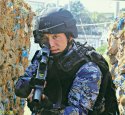I don't think you could draw too many conclusions from that exchange, since above all else, the entire event was carefully planned and managed by the PLA to give away minimal useful Intel.
The main British officer being interviewed in that piece always had a superior smirk on his face, but that was almost certainly because he was placed with the weakest Chinese cadets, who were undoubtably more interested in observing him than merely doing the exercises.
In addition, both British participants are graduates, whereas the Chinese cadets were still I'm training (we were only told that the cadets they were bunked with were 4th years, but note that those cadets were acting as translators and observers, and did not appear to have participated in the JinWu Cup exercises, so the actual cadets they were training with may have been younger still - the professor interviewed near the start mentioned 18 and 19 year olds, so those cadets may have been that young). The 29 year old officer also may well have had many years of military service before going to sandhurst.
As such, it's little wonder he has more experience and better honed skills. I would expect that smirk to have been wiped off his face if he had been placed with the best team.
The most useful insight I got from that was that the PLA value discipline greatly, whereas the British value initiative.
I think that is an area where the PLA should work more on. Discipline is important, but so is initiative. They should start giving their officers especially greater freedoms and latitude during training.
Not only is that good practice, but it is also a useful selection process by itself.
Flexibility and initiative is largely down to the character of the person in question, but it could be nurtured and honed with practice and experience.
The cadets should be put in more situations where they need to figure out what they have to themselves do to accomplish and achieve their orders and objectives rather get into the habit of always looking for orders to tell them what to do next.
There should also be a few unrealistically hard challenges, and maybe one or two impossible ones.
That serves as both a means to identify the truly exceptional candidates, but also to teach the cadets that with the best will in the world, sometimes an objective simply cannot be achieved.
In such instances, it is better to be able to recognise that early on, and report that back up the chain so they can plan around that rather than embark on a hopeless suicide mission that gets the unit wiped out, and worse, leave other units left hanging if they were depending on that objective being taken for them to be able to achieve their own objectives.



+in+training+(1).jpg)



